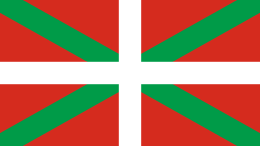Basque parliamentary election, 1990
Basque parliamentary election, 1990

|
|
|
|
All 75 seats in the Basque Parliament
38 seats needed for a majority |
| Registered |
1,687,936  1.7% 1.7% |
| Turnout |
1,029,457 (61.0%)
 8.6 pp 8.6 pp |
| |
First party |
Second party |
Third party |
| |
.jpg) |
.jpg) |
 |
| Leader |
José Antonio Ardanza |
Ramón Jáuregui |
Iñaki Esnaola |
| Party |
EAJ/PNV |
PSE–PSOE |
HB |
| Leader since |
2 March 1985 |
16 June 1988 |
1986 |
| Last election |
17 seats, 23.6% |
19 seats, 22.0% |
13 seats, 17.4% |
| Seats won |
22 |
16 |
13 |
| Seat change |
 5 5 |
 3 3 |
±0 |
| Popular vote |
289,701 |
202,736 |
186,410 |
| Percentage |
28.3% |
19.8% |
18.2% |
| Swing |
 4.7 pp 4.7 pp |
 2.2 pp 2.2 pp |
 0.8 pp 0.8 pp |
|
| |
Fourth party |
Fifth party |
Sixth party |
| |
.jpg) |
.jpg) |
 |
| Leader |
Carlos Garaikoetxea |
Jaime Mayor Oreja |
Kepa Aulestia |
| Party |
EA |
PP |
EE |
| Leader since |
4 September 1986 |
20 January 1989 |
1987 |
| Last election |
13 seats, 15.8% |
2 seats, 4.8%[lower-alpha 1] |
9 seats, 10.8% |
| Seats won |
9 |
6 |
6 |
| Seat change |
 4 4 |
 4 4 |
 3 3 |
| Popular vote |
115,703 |
83,719 |
79,105 |
| Percentage |
11.3% |
8.2% |
7.7% |
| Swing |
 4.5 pp 4.5 pp |
 3.4 pp 3.4 pp |
 3.1 pp 3.1 pp |
|
|
|
The 1990 Basque parliamentary election was held on Sunday, 28 October 1990, to elect the 4th Basque Parliament, the regional legislature of the Spanish autonomous community of the Basque Country. At stake were all 75 seats in the Parliament, determining the Lehendakari (President of the Basque Country).
The Basque Nationalist Party (EAJ-PNV) won 22 seats, the Socialist Party of the Basque Country (PSE-PSOE) came second with 16 seats, People's Unity (HB) came third with 13 seats and Basque Solidarity (EA) won 9 seats. The People's Party (PP) and Basque Country Left (EE) each won 6 seats.
Electoral system
The 75 members of the Basque Parliament were elected in 3 multi-member districts, corresponding to the Basque Country's three provinces, using the D'Hondt method and a closed-list proportional representation system. Each district was assigned a fixed set of seats, distributed as follows: Alava (25), Biscay (25) and Gipuzkoa (25).
Voting was on the basis of universal suffrage in a secret ballot. Only lists polling above 5% of valid votes in each district (which include blank ballots—for none of the above) were entitled to enter the seat distribution.[1]
Results
Overall
|
Blank ballots |
7,580 | 0.74 | +0.30 |
|
|
| Total |
1,024,299 | 100.00 | |
75 | ±0 |
|
| Valid votes |
1,024,299 | 99.50 | +0.09 |
|
| Invalid votes |
5,158 | 0.50 | –0.09 |
| Votes cast / turnout |
1,029,457 | 60.99 | –8.63 |
| Abstentions |
658,479 | 39.01 | +8.63 |
| Registered voters |
1,687,936 | |
|
| Source: Argos Information Portal |
- 1 2 People's Party of the Basque Country results are compared to AP–PL totals in the 1986 election.
|
References

.jpg)
.jpg)

.jpg)
.jpg)